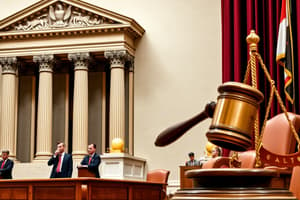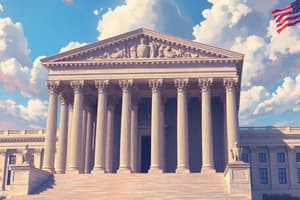Podcast
Questions and Answers
Which of the following is NOT considered a constitutional court?
Which of the following is NOT considered a constitutional court?
- Territorial Courts (correct)
- U.S. District Courts
- U.S. Court of Appeals for the Federal Circuit
- U.S. Court of Appeals
What is the primary duty of modern federal judges?
What is the primary duty of modern federal judges?
- To hear and decide cases (correct)
- To issue arrest warrants
- To handle legal matters related to tax cases
- To determine bail in federal criminal cases
Which of the following courts was established in 1891?
Which of the following courts was established in 1891?
- U.S. Tax Court
- U.S. Courts of Appeals (correct)
- U.S. Court of Federal Claims
- U.S. Court of International Trade
What type of court handles cases involving monetary claims against the federal government?
What type of court handles cases involving monetary claims against the federal government?
What is the term length for judges in the District of Columbia Superior Court?
What is the term length for judges in the District of Columbia Superior Court?
Which of the following methods can be used to remove a federal judge from office?
Which of the following methods can be used to remove a federal judge from office?
At what age can a federal judge retire with a full salary for the rest of their lives, after serving at least 10 years?
At what age can a federal judge retire with a full salary for the rest of their lives, after serving at least 10 years?
What type of court handles cases related to international trade?
What type of court handles cases related to international trade?
Flashcards
District Courts
District Courts
Federal trial courts created in 1789; 94 exist today.
U.S. Courts of Appeals
U.S. Courts of Appeals
Courts established in 1891 that review cases from district courts.
U.S. Court of Appeals for the Federal Circuit
U.S. Court of Appeals for the Federal Circuit
Created in 1982, hears specific cases like patents.
U.S. Court of International Trade
U.S. Court of International Trade
Signup and view all the flashcards
U.S. Court of Federal Claims
U.S. Court of Federal Claims
Signup and view all the flashcards
Magistrate Judges
Magistrate Judges
Signup and view all the flashcards
Judicial Term Length
Judicial Term Length
Signup and view all the flashcards
Judges' Retirement
Judges' Retirement
Signup and view all the flashcards
Study Notes
Federal Courts
- Federal judges serve during good behavior, which is a principle that ensures judges remain nonpartisan and independent while in office. This concept is rooted in the idea that judicial decisions should be made fairly and without influence from external pressures, allowing judges to uphold the rule of law effectively.
- Judges are appointed for life, unless they die or resign. This lifetime appointment is designed to provide a degree of security that enables judges to make decisions based solely on their interpretation of the law rather than on political pressures or concerns about reelection. Such a system is intended to foster judicial independence which is a cornerstone of the American judicial system.
- Judges may retire at age 70 or 65 with at least 10 or 15 years of service and keep their full salary for the rest of their lives, which incentivizes experienced judges to serve until they reach retirement age. This retirement provision allows judges to enjoy financial stability in retirement, and it encourages them to continue serving the public until they are ready to step down, ensuring a steady flow of judicial expertise in the system.
- Federal judges may be removed from office by impeachment, a process that is intended to hold judges accountable for misconduct, corruption, or failure to perform their judicial duties. This safeguard helps maintain the integrity of the judicial system and reinforces public confidence in the judiciary as an impartial entity.
- Federal judges handle a variety of cases, including criminal and bankruptcy cases. Their jurisdiction often includes significant cases that can impact national policies, individual rights, and the interpretation of federal laws. Judges are tasked with understanding complex legal principles and applying them to unique sets of circumstances in their courtrooms.
- Special courts are appointed for terms of 8-15 years, unlike Constitutional courts that are appointed for life. These special courts, which address specific areas of law, such as tax or military issues, are designed to ensure that experts can focus on specialized areas while also allowing for periodic review and renewal of appointments, which can bring fresh perspectives to the bench.
- Judges in the District of Columbia have 4-year terms, which reflects a different set of governance needs specific to the federal district. This shorter term is indicative of the unique legal framework and governance structure in D.C., where local laws and federal authority often intersect.
- District courts have at least one bankruptcy judge, ensuring that bankruptcy cases can be handled efficiently and expertly. This specialization is crucial because bankruptcy law can be particularly complex and requires judges to have a deep understanding of both legal and financial principles.
- Judges have limited involvement in daily court administration, meaning that while they are responsible for rulings and legal decisions, they are not wrapped up in everyday operational details. This separation allows judges to focus on their core duties of adjudication while administrative tasks are typically handled by court staff.
- Court staff includes clerks, bailiffs, court reporters, and probation officers, who all play integral roles in the function of the court system. Clerks manage case files and assist judges with legal research, bailiffs maintain order in the courtroom, court reporters create accurate transcripts of proceedings, and probation officers supervise offenders and assist with rehabilitation.
- The number of United States magistrates is over 400, reflecting the significant role they play in the federal judiciary. These magistrates assist judges by handling preliminary matters, such as bail hearings and pretrial conferences, allowing district judges to focus on more complex cases.
- Judges appoint magistrates who handle some cases previously managed by judges themselves. This delegation of authority allows the judicial system to operate more efficiently while maintaining high standards of legal competency, as magistrates are trained professionals who can effectively manage a variety of cases.
- Judges have the power to set bail and to try minor federal offenses. This authority is critical in ensuring that the legal process is effective and fair, thereby maintaining adherence to the principle of justice while safeguarding individual liberties.
- Salaries of federal judges are determined by Congress and are based on factors such as the level of the court in which the judge serves, geographic location, and the judge's experience and length of service. This deliberative process seeks to ensure equitable compensation for judges throughout the country while recognizing the diverse challenges they encounter depending on their court's location and the nature of their caseloads.
- This system aims to ensure that judicial compensation is consistent across the country, while also acknowledging the varying responsibilities and challenges faced by judges in different courts. Federal judges typically enjoy competitive salaries relative to other professions, which is designed to attract qualified individuals to serve in these vital roles within the federal judicial system. Moreover, the compensation structure reflects the significant commitment and expertise required to manage the complexities of federal law.
- Additionally, judges may receive benefits such as retirement plans, health insurance, and other perks associated with federal employment, contributing to the overall appeal of judicial positions. These benefits not only promote job satisfaction amongst judges but also serve as incentives for talented legal professionals to consider a career in the judiciary.
- Salaries for federal judges are established by Congress, reflecting a complex consideration of various factors, including the responsibilities and demands of the position, the need to attract qualified individuals to the judiciary, and the fiscal constraints of the federal budget. By assessing these elements, Congress seeks to create a remuneration system that reconciles the necessity for a competent judiciary with broader economic realities.
- These salaries are often compared to those in the private sector to ensure competitiveness, and they are periodically reviewed and adjusted by Congress to account for inflation and changes in the cost of living. This practice ensures that the compensation remains relevant and can adequately attract and retain qualified jurists within the federal court system.
- Federal judges, including those on the Supreme Court, District Courts, and Appeals Courts, receive set salaries that remain fixed during their terms, providing them with financial stability while they adjudicate cases of federal importance. This stability is critical in preserving the judicial system's integrity, ensuring judges can focus solely on the law without concerns about their financial security impacting their decisions.
- Additionally, federal judicial salaries cannot be diminished during a judge's term, ensuring that there is no external influence on their decisions based on financial concerns. This provision serves as a robust safeguard against corruption and ensures that judges are protected from potential conflicts arising from personal financial pressures.
Types of Federal Courts
- Constitutional Courts
- U.S District Courts: These courts serve as the trial courts of the federal system, handling cases involving federal law, matters between states, and cases involving citizens from different states. They have original jurisdiction and can address both civil and criminal cases, making them a crucial component of the federal judiciary.
- U.S Courts of Appeals: These courts handle appeals from the district courts, reviewing cases for legal errors without retrying them. The decisions made by the Courts of Appeals are vital, as they can set precedents that influence future cases and legal interpretations across the country.
- Special Courts
- U.S Court of Federal Claims: This court hears claims for money damages against the United States, covering a wide range of issues from contracts to takings. Its specialized focus allows for more efficient resolution of financial disputes involving federal entities.
- U.S Court of International Trade: This court deals specifically with cases involving international trade and customs issues, playing a critical role in regulating and facilitating international commerce.
- Territorial Courts (e.g., U.S Courts for the territories): These courts exist in U.S. territories and serve as local judicial bodies, applying both federal law and local law in their jurisdictions.
- U.S Tax Courts: This court has jurisdiction over disputes involving federal tax laws, ensuring that taxpayers have a venue to challenge the Internal Revenue Service's decisions. Its establishment highlights the need for specialized knowledge in tax law, as these cases can be quite complex and impactful for individuals and businesses alike.
Studying That Suits You
Use AI to generate personalized quizzes and flashcards to suit your learning preferences.



